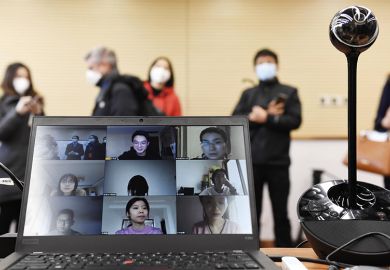The switch to remote learning sparked by the coronavirus crisis is likely to benefit UK universities in the long term by encouraging them to offer more online courses, a Times Higher Education debate between three former higher education ministers has heard.
Speaking in the first of a series of online THE events on post-pandemic higher education, Jo Johnson told a global audience of more than 1,200 people that the rapid pivot to virtual learning in UK universities would “stand us in good stead”.
“This has, in some ways, been a necessary forcing process to get universities to move faster on how they deliver material digitally and online,” said Mr Johnson in conversation with Lord Willetts and Chris Skidmore.
He added that it was “right that we are taking advantage of this crisis” by considering how distance learning was delivered and how it could be improved and scaled up.
“This process is forcing our brilliant academics to prepare academic courses at distance – we should have been doing it anyway over the past decade, but we are now doing it and will get better and better at it,” said Mr Johnson, who argued that this transformation would allow UK higher education to grow its presence in global markets that had not yet been properly explored.
“That is really where a lot of the exciting growth opportunities will be,” he explained, saying that it might allow more recruitment from “income groups in Asia and Africa where young people do not necessarily want the full-fat, high-cost, three- to four-year programme living in an English-speaking country”.
“We have to be ready as a system to meet the demand from these groups,” added Mr Johnson, who said the “excellence we have had in traditional delivery of higher education will be replicated in time in these new ways of doing things”.
More widely, universities should also use the coronavirus crisis to assess their international recruitment processes and ensure that they were fully digital. “Institutions that are messing around sending applications back and forth internationally are really going to fall behind,” he said.
While praising lecturers’ rapid switch to remote learning, Mr Skidmore warned that “there needs to be a debate about what good online learning looks like that places the tutor at the centre but does not just fall back on Zoom as an alternative”.
Lord Willetts agreed, saying that “putting a lecture on Zoom was an immediate and basic start” that should be built on.
“At its best, online pedagogy is very sophisticated, using data about what [students] are doing to improve the quality of the educational experience,” said Lord Willetts, adding that “this takes a lot of work”.
“What is happening now is just the start,” he said.
jack.grove@timeshighereducation.com






